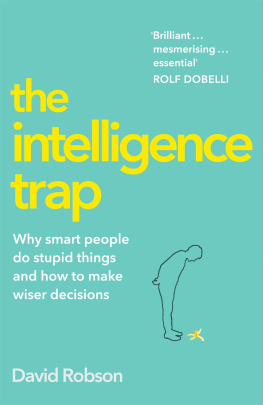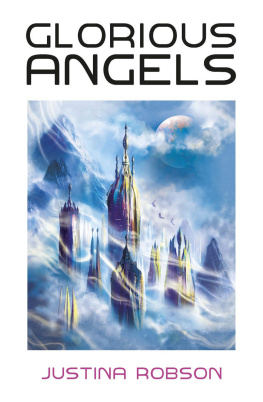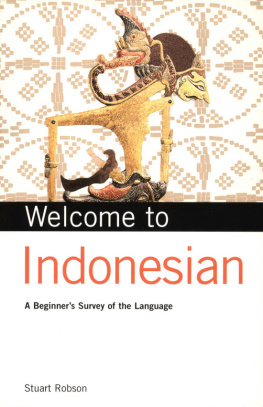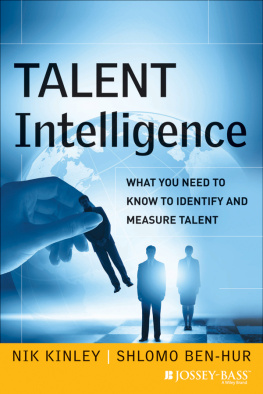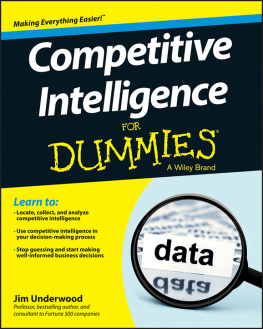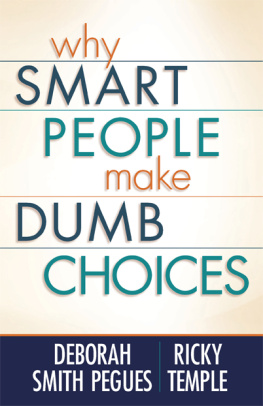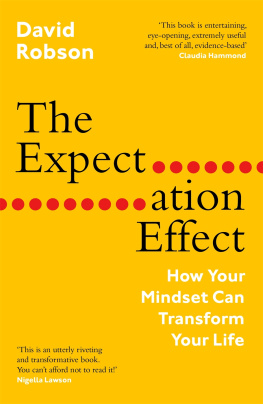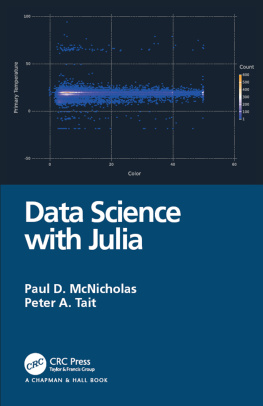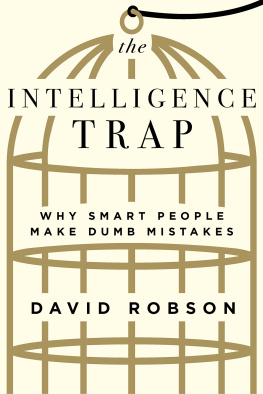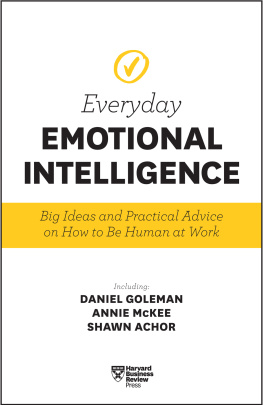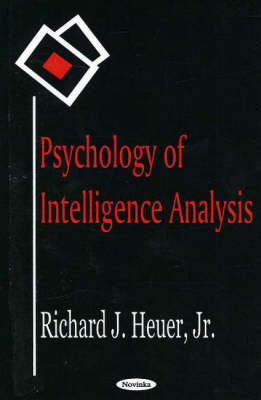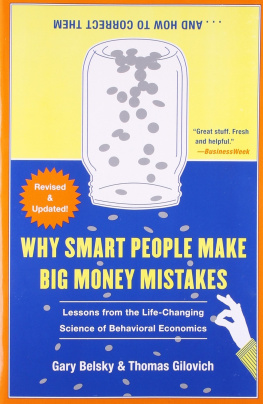The Intelligence Trap
Why Smart People Make Stupid Mistakes and How to Make Wiser Decisions
David Robson

www.hodder.co.uk
First published in Great Britain in 2019 by
Hodder & Stoughton
An Hachette UK company
Copyright David Robson 2019
The right of David Robson to be identified as the Author of the
Work has been asserted by her in accordance with
the Copyright, Designs and Patents Act 1988.
All rights reserved. No part of this publication may be reproduced,
stored in a retrieval system, or transmitted, in any form or by any
means without the prior written permission of the publisher, nor be
otherwise circulated in any form of binding or cover other than that
in which it is published and without a similar condition being
imposed on the subsequent purchaser.
A CIP catalogue record for this title is available from the British Library
ISBN 9781473669864
Hodder & Stoughton Ltd
50 Victoria Embankment
London
EC2Y 0DZ
www.hodder.co.uk
To my parents, and to Robert
Contents
Introduction
Venture into the darker recesses of the internet, and you may come across the views of a man named Kary. If he is to be believed, he has some unique insights that could change the world order.
He suspects he was abducted by an alien near the Navarro River, California, for instance, after encountering a strange being who took the form of a glowing raccoon with shifty black eyes. He cant actually remember what happened after the little bastard gave him a courteous greeting; the rest of the night is a complete blank. But he strongly suspects it involved extra-terrestrial life. There are a lot of mysteries in the valley, he writes, cryptically.
Hes also a devoted follower of astrology. Most [scientists] are under the false impression that it is non-scientific and not a fit subject for their serious study, he huffs in a long rant. They are dead wrong. He thinks its the key to better mental health treatment and everyone who disagrees has their heads firmly inserted in their asses. Besides these beliefs in ET and star signs, Kary also thinks that people can travel through the ether on the astral plane.
Things take a darker turn when Kary starts talking about politics. Some of the big truths voters have accepted have little or no scientific basis, he claims. This includes the belief that AIDS is caused by HIV virus and the belief that the release of CFCs into the atmosphere has created a hole in the ozone layer.
Needless to say, these ideas are almost universally accepted by scientists but Kary tells his readers that they are just out for money. Turn off your TV. Read your elementary science textbooks, he implores. You need to know what they are up to.
I hope I dont have to tell you that Kary is wrong.
The web is full of people with groundless opinions, of course but we dont expect astrologers and AIDS denialists to represent the pinnacle of intellectual achievement.
Yet Karys full name is Kary Mullis, and far from being your stereotypically ill-informed conspiracy theorist, he is a Nobel Prize-winning scientist placing him alongside the likes of Marie Curie, Albert Einstein and Francis Crick.
Mullis was awarded the prize for his invention of the polymerase chain reaction a tool that allows scientists to clone DNA in large quantities. The idea apparently came to him during a flash of inspiration on the road in Mendocino County, California, and many of the greatest achievements of the last few decades including the Human Genome Project hinged on that one moment of pure brilliance. The discovery is so important that some scientists even divide biological research into two eras before and after Mullis.
There can be little doubt that Mullis, who holds a PhD from the University of California, Berkeley, is incredibly intelligent; his invention can have only come from a lifetime dedicated to understanding the extraordinarily complex processes inside our cells.
But could the same genius that allowed Mullis to make that astonishing discovery also explain his beliefs in aliens and his AIDS denialism? Could his great intellect have also made him incredibly stupid?

This book is about why intelligent people act stupidly and why in some cases they are even more prone to error than the average person. It is also about the strategies that we can all employ to avoid the same mistakes: lessons that will help anyone to think more wisely and rationally in this post-truth world.
You dont need to be a Nobel Prize winner for this to apply to you. Although we will discover the stories of people like Mullis, and Paul Frampton, a brilliant physicist who was fooled into carrying two kilograms of cocaine across the Argentinian border, and Arthur Conan Doyle, the famed author who fell for two teenagers scams, we will also see how the same flaws in thinking can lead anyone of more than average intelligence astray.
Like most people, I once believed that intelligence was synonymous with good thinking. Since the beginning of the twentieth century, psychologists have measured a relatively small range of abstract skills factual recall, analogical reasoning and vocabulary in the belief that they reflect an innate general intelligence that underlies all kinds of learning, creativity, problem solving and decision making. Education is then meant to build on that raw brainpower, furnishing us with more specialised knowledge in the arts, the humanities and the sciences that will also be crucial for many professions. The smarter you are according to these criteria the more astute your judgement.
But as I began working as a science journalist, specialising in psychology and neuroscience, I noticed the latest research was revealing some serious problems with these assumptions. Not only do general intelligence and academic education fail to protect us from various cognitive errors; smart people may be even more vulnerable to certain kinds of foolish thinking.
Intelligent and educated people are less likely to learn from their mistakes, for instance, or take advice from others. And when they do err, they are better able to build elaborate arguments to justify their reasoning, meaning that they become more and more dogmatic in their views. Worse still, they appear to have a bigger bias blind spot, meaning they are less able to recognise the holes in their logic.
Intrigued by these results, I began looking further afield. Management scientists, for example, have charted the ways that poor corporate cultures aimed to increase productivity can amplify irrational decision making in sports teams, businesses and government organisations. As a result, you can have whole teams built of incredibly intelligent people, who nevertheless make incredibly stupid decisions.
The consequences are serious. For the individual, these errors can influence our health, wellbeing and professional success. In our courts it is leading to serious miscarriages of justice. In hospitals, it may be the reason that 15 per cent of all diagnoses are wrong, with more people dying from these mistakes than diseases like breast cancer. In business, it leads to bankruptcy and ruin.
The vast majority of these mistakes cannot be explained by a lack of knowledge or experience; instead, they appear to arise from the particular, flawed mental habits that come with greater intelligence, education and professional expertise. Similar errors can lead spaceships to crash, stock markets to implode, and world leaders to ignore global threats like climate change.
Next page
